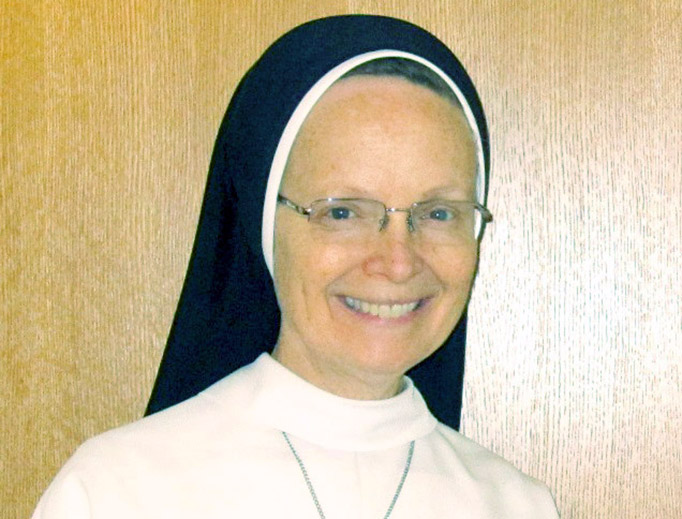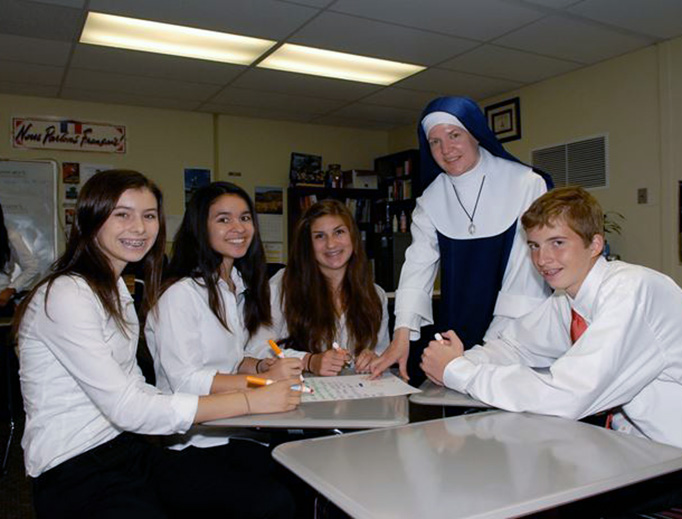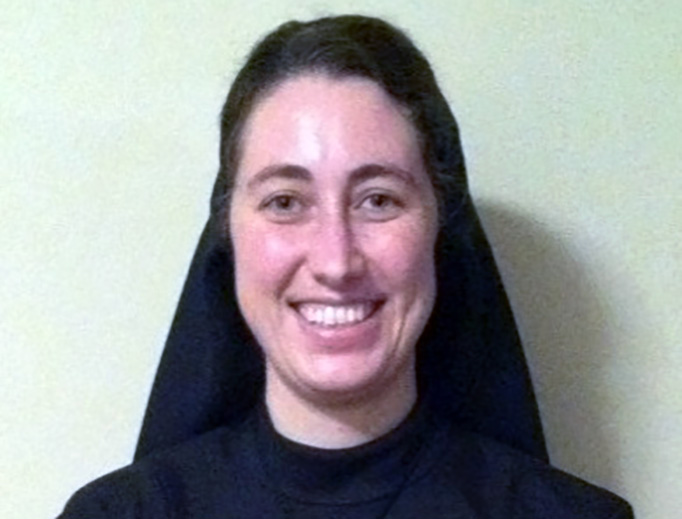A Glimpse at Life in 6 Traditional Religious Communities
“You have to pray, put yourself in the hands of the Lord and trust Him.”

While overall the numbers of women religious have declined dramatically in the years since Vatican II (1962-65), some traditional communities, while relatively small, have done well for vocations. I spoke with six women religious in traditional communities that are doing well for vocations, asking them to share about why they entered religious life, and what kind of women would be a good fit for their communities.
Sister Scholastica Radel, Benedictines of Mary, Queen of Apostles (www.benedictinesofmary.org), Gower, Missouri
I was one of the first novices. I’m from the Diocese of Arlington, Virginia. I first heard the story of Sr. Wilhelmina [founder of her community] when I was in high school. We had to study Latin, and took a field trip to attend a Latin Mass. It was in conjunction with that trip that I learned that a new community was starting.
I had discerned that I had a religious vocation. I attended a Mass with Pope John Paul II in New York City. He brought up the topic of young people and religious vocations, and I thought he was talking to me. I had also read St. Therese’s Story of a Soul, which had an impact on me.
I didn’t know that I wanted to be a Benedictine. However, when I saw the community’s liturgical life, still in seed form then, I thought it was beautiful to be so deeply connected to a tradition going back 1,500 years. When you read the Rule of St. Benedict, he describes how the Divine Office should be said. I’m proud to be carrying on his work. And, he would have been chanting in Latin. We’re centered around the liturgical life, the Mass. We draw our strength from that.
I loved the monastic life when I joined, but I love it even more now. I think Mother Angelica said it well: it is a hard life, but a beautiful life. I think it is more beautiful to me now [than when I entered]. It is a rich treasure that I continue to appreciate.
* * * *
[Our postulants] have a diverse background, but there is a common thread among them. They have a bit of a disconnect from the world; they believe there’s more to life than Facebook. They are looking for a deeper reality in life, and are striving for holiness. They are serious about their spiritual life.
We’re looking for young women with a strong sense of community, which they might have experienced at their parish or homeschool community. Many of our sisters have a homeschool background, or come from a Latin mass community [they attend Mass celebrated in the Extraordinary Form]. I myself, however, did not come from a Latin mass background!
Sister Joseph Andrew Bogdanowicz, OP, Dominican Sisters of Mary, Mother of the Eucharist (www.sistersofmary.org), Ann Arbor, Michigan

Four of us in the community believed God was calling us to found a new community. Mother Assumpta [who was previously the superior of the Nashville Dominicans] was good friends with Cardinal John O’Connor of New York, and he agreed to canonically establish us.
Tom Monaghan, the great Catholic philanthropist, heard about our new community. We’re a teaching community, and Tom wanted to build Catholic schools. He invited us to Ann Arbor, Michigan [Monaghan is from Ann Arbor], and after much prayer and consultation between our bishop in New York and the Bishop of Lansing, we moved.
As a vocation director, I thought the move would prove itself a good idea if vocations came. Sure enough, the day after we arrived in Ann Arbor, a young woman came to our door asking about joining us.
It just shows that you have to pray, put yourself in the hands of the Lord and trust Him.
* * * *
We live out our religious life according to what our understanding is of what the Church asks from us. We strive to be faithful to the charism of our founders. We know it, and we live it as a community.
We have a close community life. We genuinely love our sisters. A woman’s heart is made to be a part of a family, and the community has to be the sister’s family.
We have a future; a woman doesn’t want to join a community if it won’t be around long.
We are faithful to the Church, and we live an authentic prayer life.
We’re a youthful community, which is appealing to young women, and a joyful community. Ask our new sisters who come to live with us what they first notice about our community, and I think they’ll say abundant joy.
We also have an identifiable habit. I travel frequently, and I don’t seem to have a moment to myself. People are always coming up to me asking to pray for their intentions or saying how nice it is to see a sister in habit. Children want to touch my rosary beads. The world is frantic for God. Helping them find Him is part of our spiritual motherhood.
We’re devoted to prayer. As Dominicans, first we pray, then we go out and teach. In addition to daily Mass and all of our devotions, we added a daily Eucharistic Holy Hour. The Eucharist defines who we are. It’s true for all of our sisters, wherever they are.
Sister Clare Matthiass, Franciscan Sisters of the Renewal, (http://franciscansisterscfr.com/), New York City
I was a student at Franciscan University of Steubenville. I participated in a World Youth Day event, and first met the sisters. I knew if I was called to religious life, I would join them.
I had quite a process of discernment, when I received the grace of knowing. When that clarity came to me, I called the community immediately. I didn’t need to look at other communities. I visited New York, discerned and entered. I haven’t looked back.
* * * *
We were founded to live in inner city neighborhoods, assisting the poor with their spiritual and material needs. [A woman who would be a good fit for our community is someone] who feels in her heart that the Lord is calling her to a special intimacy with Him. This is a consecration call. After that, one who feels called to serve the poor in a radical Gospel life. Ours is not a life for someone seeking security, but for one who wants an adventurous life relying on Divine Providence.
[Women who enter our community] are in their 20s; our cut off age is 35. Our sisters who professed final vows are all in their 30s. We live a plain and simple life, and have no fixed income. We wash the dishes together, for example, as part of our recreation, and don’t have a dishwasher. We don’t have televisions, we don’t use cell phones and our convents don’t have the Internet. We keep our lives simple and focused. God is first, our community second and the poor third.
Mother Teresa Christe, Marian Sisters of Santa Rosa (www.mariansisters.com), Santa Rosa, California

I felt directed toward the married state. I had a life full of activity; we owned horses, I liked ice skating. As a teenager, I dreamed of getting married and moving away from the big city to Montana, where I’d have 10 horses and 10 children.
Although I had read about women religious, I had never met one. It was a dormant period in religious life when I grew up; if I did see a sister, I did not recognize her because she did not wear anything to indicate her vocation.
In the 8th grade, my parents sent me to a Catholic boarding school in northern Idaho. It was there that I first encountered sisters in full habit. I was scared to death when I arrived, because I thought the nuns would be hard and strict. But, they were the most kind, warm and sensitive people I’d ever met. I was happy there. I learned to live in the state of grace and have fun.
My respect for religious life grew, but I didn’t feel the call. At 17, I got my first job, and began making my own money. When I went to Mass, I thought I’d be happy because for the first time I could put money into the collection basket that I’d earned myself.
But, when the basket came around, I had an unusual and dramatic experience. I pulled the money out of my pocket, looking at it, then the crucifix. I felt a profound sadness. I said to Our Lord, “You gave me your whole self, and all I can give you is a few dollars.”
I had the sense that I wanted to put my whole self into the basket. I knew God wanted more from me.
I went on a high school retreat, and listened to a priest speaking on vocations. He said that we were all like a tree, which bears fruit from the use of our time, talent and treasure. As we grow into adulthood, we give to God from that tree.
However, if you are called to religious life, you give God the whole tree. He gets to plant it where he wants, and pick from it what he wants. The whole tree belongs to him. Some are called to give that whole tree.
I told a woman religious that I loved children, and of my desire to have my own. She told me about spiritual motherhood, and said that if I was called to religious life, I’d have more children than I could imagine.
I entered the convent after high school. I thought I would be unhappy there, but I experienced the joy that one experiences in a true vocation.
* * * *
[A woman who would be a good fit for our community would be someone] who has a love for the Church, striving for unity while using both forms of the Roman rite [Ordinary and Extraordinary Form]. One who is self-sacrificing and courageous in her love for God, Our Lady and the Church. One who loves the liturgy, and has a Marian spirituality and a sense of adventure.
She should be age 20 to 35, with some exceptions. It is helpful if she has a college education, but she can also be educated within the community.
We’re not a long-established community—if this is what she wants, I can point her to some great ones—but if she wants to be part of an adventure in building one, this is the place for her.
Sister Mary Hanah Doak, the Religious Sisters of Mercy, (www.rsmofalma.org), Alma, Michigan

I was impressed with their love for one another, and the sincere friendships they enjoyed. I also liked that they were professionals, and were engaged in apostolic service.
I entered the community, and have since found great joy. I enjoy peace knowing I’m fulfilling God’s will in my life. I’ve also come to know myself. I knew I’d learn about God, but I’ve been surprised at how much I learned about the human person.
One thing I’ve observed about our community is how very unique each sister is. We all wear the same habit, so an outsider might think we’re alike. But that’s not the case. When you do away with the externals, such as a person’s selection of clothes or a hairstyle, you come to discover the mystery of each person within the community.
I’ve been grateful for the opportunity to grow in the spiritual life, as well as develop a well-ordered life as a person. It comes through religious formation, which is a difficult process. But, Our Lord speaks to us through our lawful superiors. Obedience brings joy.
* * * *
We’re interested in women with an interior sense of a call to the religious life, with a love of the Church and a desire to serve Her. Many of our applicants have an interest in higher studies, although that’s not always the case. Some of our sisters have degrees when they enter, others don’t.
The women need to be in good physical and mental health, usually between the ages of 18 and 35. They have to have received all their sacraments of initiation, and be free to enter.
If these signs are manifested, we invite the woman to visit our community. If she finds a resonance with the community, and the feeling is reciprocal, she’d make a good candidate to enter.
Sister Anne Catherine Burleigh, Dominican Sisters of St. Cecelia (www.nashvilledominican.org), Nashville, Tennessee.
I’m originally from Cincinnati, Ohio. I attended Catholic schools, but I didn’t learn much about the Catholic faith. I was taught by a sister in both the 1st and 4th grade, but otherwise did not have too much exposure to sisters.
I went to college at the University of Dallas, and first met the Dominican Sisters while I was a senior there. One of my roommates at the university had entered the community. It was a surprise to me at the time, because I didn’t think women still became nuns.
I thought I was called to marriage, but the Lord had other plans for me. I visited the community, and found I was drawn to the beauty of their life. The sisters loved the Faith, and practiced it with joy. They loved Our Lord, they loved the Blessed Mother and they loved the Holy Father. They led a balanced life and were dedicated to study. Their community life was strong.
I had begun teaching elementary school, and the Nashville Dominicans were teachers. I thought it was a good fit for me.
* * * *
We attract all kinds of women. Our community is really very diverse. When we have a vocations retreat, young women come from throughout the country and from other countries. Some are teachers, but most are from other fields. But we’re not a one-mold-fits-all kind of community.
However, there is one thing we all have in common: a wholehearted desire to give ourselves to the Lord, and an acceptance of his call to poverty, chastity and obedience.












